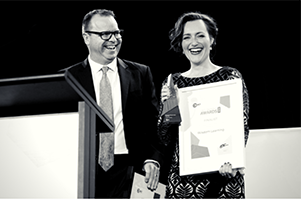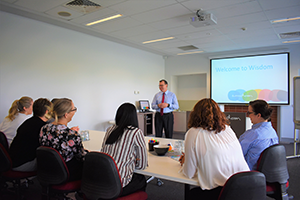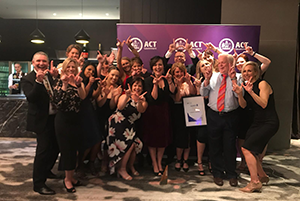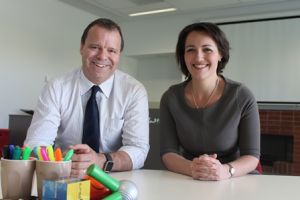 As many people are discovering, not all online learning is created equal. The coronavirus quarantine has brought to the fore both the challenges and opportunities associated with learning remotely and the experience has been quite varied amongst learners.
As many people are discovering, not all online learning is created equal. The coronavirus quarantine has brought to the fore both the challenges and opportunities associated with learning remotely and the experience has been quite varied amongst learners.
- Families: Many families of school-age students have been forced to grapple with the complexities of learning from home, such as technology issues, variable levels of computer literacy, managing kids of different ages and learning styles, the need for well-structured lessons, finding ways to encourage social interaction, balancing the volume of work, and maintaining motivation for self-directed learning.
- Job seekers: There are people who are nervous about their employment prospects and are looking at online courses as a way of re-skilling and improving their employability prospects in what will be a tough job market.
- People with disabilities: People with anxiety and other mental health conditions and those with mobility impairments that have found it difficult to attend lectures on campus in the past, may find online learning better meets their needs.
The challenges aren’t only on the learner’s end. The Vocational Education and Training (VET) sector face unique challenges when it comes to online delivery. It is underpinned by competency-based learning where students need to apply skills directly to the workforce as part of assessments, therefore requiring a far more hands-on approach.
Rod Hattch and Jana Clyde, co-owners of award-winning local training business, Wisdom Learning, point to the fact that there is a big difference between e-learning and digital learning. Their online training platform, MyWisdom, has evolved over many years and offers digital learning as opposed to ‘click and read’ e-learning.
Rod and Jana distinguish between the ‘one-size-fits-all’ e-learning programs provided by large global providers and the training offered by local Australian companies such as Wisdom. At Wisdom participants have access through a digital platform to a live, qualified and skilled trainer offering engaging Australian content specifically designed for the ‘real world’.


The Wisdom Wow
While Rod and Jana, acknowledge that the coronavirus lockdown forced them to switch their business model from 95% face-to-face to 95% online delivery in the space of two weeks; they already had the advantage of a tried and tested online delivery platform in place. While it was a seamless experience from their clients’ perspective, this still involved an enormous amount of work for the team. Unlike webinars or online seminars, Wisdom’s aim is to run digital interactive workshops. The challenge was to find ways to replicate the points of difference that made attending a Wisdom training course special.
Wisdom is well known for its attention to even the smallest details that make a learner’s experience enjoyable. Their famed lolly bar and amazing gourmet lunches help to feed the body while they feed the mind. The Wisdom team thought long and hard about how they could go above and beyond and replicate some of the “Wisdom Wow” experience. Taking inspiration from their popular lolly bar, one of the ways to surprise and delight their clients was by sending learners a package of goodies. Rod refers to this as ‘intention through detail’ and it stems from the organisation’s learner-centric focus. At Wisdom, they put the learner front and centre and focus on all the minute details that will enhance their experience.
Looking through the lens of the learner’s perspective
As soon as everything went digital everyone was bombarded by webinars to the point of distraction as businesses fought to remain top of mind. At the same time, families were distracted with homeschooling kids, looking after vulnerable family members and trying to work from home. Rod says a value that’s important to the organisation is humility and this reminds them that none of this is about them. When the team at Wisdom determine how to respond to the changing environment brought about by the coronavirus crisis, they try not to think about the impact it is having on them, but rather to keep the focus on the client and the issue they want to solve. Rod believes this is what will help them see this through.
Jana agrees that focusing on how best to serve their learners has ensured that they haven’t missed a single training day. While schedules might have shifted, or been tweaked slightly, trainers being willing to be innovative and learner-centric have meant that they have found ways to support each learner. Each learner is an individual and Jana stresses that they make sure that learners are suited to the programs they are on. Learners are not just a number; the trainers at Wisdom have a personal relationship with each person and are flexible about how best to support them. This is especially important now when people are craving connection; having a facilitator checking in with each learner is really appreciated. Jana also points to a co-creation process they are undertaking. They try to look through the lens of the learner’s perspective – they might be trying to homeschool children at the same time, they or their partner may have been stood down from work, or they may be feeling anxious about their health or the future. Jana acknowledges that it’s messy and they don’t always get it right the first time, but the learners have been largely happy to work with the team as they test and refine the new format.
When it comes to their organisational clients, the team at Wisdom are adapting how assessments are done to adapt to their client’s needs. Some clients prefer a Zoom session as opposed to Canvas Conference which is their current platform, and others prefer coaching. They don’t have one solution the client has to fit, they fit with what the client prefers. In this context, they define innovation as getting the outcome for the learner in the client’s context. This means defaulting to ‘yes’ and then working out how to deliver it. Innovation is a constant question for them.



New Markets
Both Rod and Jana believe a digital-first approach has broadened their market. While they have always delivered some courses nationally, the changes they have made will allow them to offer what they do locally to a much broader national audience. In the past, they have had clients with teams in different cities, but now the organisation can do courses as a whole management group. They believe the coronavirus crisis has led to a speeding up of how open people are to interactive training or learning in different ways and this has led to broader markets. While they have always been able to do this, Rod doesn’t believe the market has been ready until now.
The opportunity to move from being a Canberra-based provider delivering courses around Australia for national clients occasionally, to being a national provider in a national market is now real.
Resilience and innovation
Wisdom has been around for over two decades and it hasn’t been a fluke that they have been able to respond, adjust and knuckle down like so many other businesses that are going through this. There are a lot of businesses that are in trouble and under a lot of pressure and Rod says it’s important not to trivialise this. However, while they will have some bruises, he believes Wisdom will come through this not broken, but stronger. The work they have been putting in over many years and the ability to adjust, pivot and be agile will hopefully allow them to come out of this better than before. Jana stresses that “it’s still bloody hard!”
Rod and Jana explain that even though innovation is in-built into their business, it doesn’t make change easy. One of the core elements of Wisdom is that it’s a values-based business and that these are lived values not just a list stuck up on a wall. The values represent the culture and these are the values that they recruit to, train to, evaluate performance to, and hold themselves to account to. Innovation is built into their processes, they constantly review, learn, refine and improve. Rod and Jana believe that for an organisation to be innovative it needs to be the way you do business not just something you do occasionally.
Innovation is always most challenging when people are already under stress.
“Then you go, you may not have wanted to learn digitally before, but now guess what you’re going to love it! It’s going to be the best thing and then they log on and there’s a technical issue,” says Jana.
“With innovation, there is also a high level of emotional intelligence needed. Change on top of an already stressful situation can mean you can be having a conversation with a learner about the fact that their platform has changed and they get emotional and you realise it’s not about the platform, it’s the personal stress that they are experiencing”.
Changes that will keep
Rod thinks that digital might be the new default although that doesn’t mean that they won’t be doing face-to-face training. It means that they are always looking at how they can get the best outcome for the client and create a great Wisdom Experience.
“If we can do that face-to-face and that’s the best way then we will do it that way. If it has to be digital that’s what we will do,” says Rod.
Rod stresses that Wisdom has always been a very agile and responsive business and will now be even more so. He believes though that the world and the markets will be changing and they will be changing along with them. The level of digital skills and literacy in the market is so much greater now and they are ready for alternatives as a provider. Wisdom will still maintain its core principles, but the mechanism of delivery may change.
To find out about upcoming Wisdom courses visit https://www.wisdomlearning.com.au/




